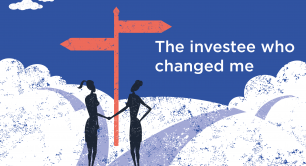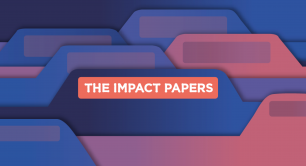The investee who changed me: “Grameen Shakti was a total eye-opener”
Meeting a social investor can be game-changing for an entrepreneur – but sometimes the lightbulb moment is even more dazzling for the one controlling the cash. In this mini-series, in partnership with EVPA, we invite social investors to share their personal stories of investees and other companies who have changed their thinking. This time, Saskia Bruysten, co-founder and CEO at Yunus Social Business.
In 2008 I was asking myself what I was going to do with the rest of my life.
I was a management consultant at Boston Consulting Group in London. I had learned a lot, but was looking around and listening to anyone who had anything interesting to say about changing the world in some shape or form. And I had the luck to hear Nobel Laureate Muhammed Yunus speak at the LSE [London School of Economics], where I was an alum.
I’d heard about microcredit, but I didn’t know Muhammad Yunus. I said to him afterwards – I love what you are doing, I want to be involved. He said, come to Bangladesh. So I got on a flight a few weeks later. A team of people at Grameen Bank [the pioneering microcredit bank founded by Yunus in 1983] organise trips for people coming from abroad: we travelled into the countryside, visited all kinds of bank branches, heard the stories of the individual women who had made a living with loans from Grameen Bank.
I said to Muhammad Yunus, I love what you are doing, I want to be involved. He said, come to Bangladesh
And we also visited Grameen Shakti.
In 2008 solar power was big in Germany, where I am from. I had no idea then that renewable energy was already a hot topic in Bangladesh as well. It was certainly not something I thought that poor people could afford.
The houses we saw were very simple wooden structures with a corrugated iron roof – and they had a solar panel on top! These systems are not cheap, they cost around $150 or more. But I learned that they were actually affordable for poor people. How? Grameen Shakti had looked at the amounts that people were paying every week for kerosene, the fuel they use to have light at night. That same amount was turned into weekly installments that allowed people over a 2-3 year time frame to pay off a solar system. For me this was a real eye opener. It was so simple and yet so logical.
Nowadays, it seems quite obvious, but 10 or 12 years ago, I didn't realise that in this way you could ensure poor people can afford quite important capital goods – if you really adapt to their needs rather than to the needs of the business.
Above: Grameen Shakti enables people in Bangladesh to pay off the cost of solar panels over a few years.
When I now look at a company to invest in, especially companies that provide essential products or services to the poor, we always ask: how are they creating a mechanism that allows people to afford this?
[Our investee] Tugende has now leased over 23,000 motorbikes to young people, mostly men, in east Africa. They have structured the payment in a way that people pay monthly installments over about 18 months to two years and these are roughly the same that they would pay as rent to a bike owner – but they’re substituting that payment for something that leads to ownership. That’s one of the reasons I was very convinced from the start with Tugende.
For Impact Water, their end client is schools: they sell water systems to schools so kids have access to clean drinking water. They also pivoted their business model several times. They realised that if they make the school pay at those times of the year when it gets revenue itself (namely when people pay for each semester), that’s when repayment rates were the highest. So again, really aligning the payment with the revenue of the underlying customer, is a very smart way of going about it.
Now we always ask: how are entrepreneurs creating a mechanism that allows people to afford this?
Was there one person within these businesses that stood out for me? I think it was really the customers that were impressive. One of the Grameen Shakti clients had not just used the solar panel for her own electricity, but had also created a cellphone charging station and created an additional small business. Another told me that in the evening they had light and could keep their shop open for longer. At Tugende, one of the drivers had made so much money with his bike that he was able to buy a piece of land and build a small house.
With simple, small items where there’s no capital good – say a water bag – you don't need an intricate mechanism, you just need to make sure that the individual product is really affordable because that’s going to be paid upfront with cash. With capital goods, like the solar system, one of our questions to the entrepreneur is always: what do people usually spend that amount of money on? What is the individual business case for the end consumer to be buying this alternative?
Where would I be now if I’d missed that lecture back in 2008? Sometimes I think I could have ended up in politics. But to be honest, I’d probably go crazy. The business method of effecting change is the most pragmatic because it’s something you as individual can change and do concretely. You don’t have to wait for anyone else.
Saskia set up Yunus Social Business in 2011 in partnership with Muhammad Yunus, to bring the success of Grameen/Yunus group of businesses to other countries. YSB grows and finances social businesses worldwide; Grameen Shakti is one of the 40+ social businesses Professor Yunus has created in Bangladesh.
Read and sign the Charter of Investors for Impact, a document setting out ten principles that drive and define investors for impact, launched by EVPA at their 15thAnnual Conference on 5-7 November 2019.


